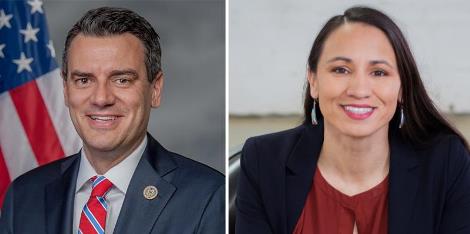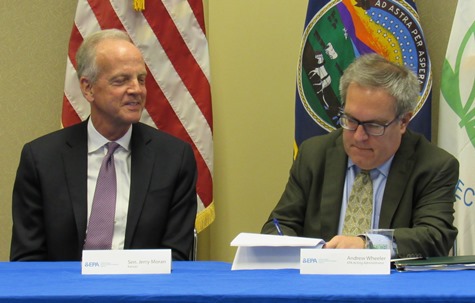
by Celisa Calacal, Kansas News Service
The midterm elections are about a week away, and the race between Republican Kevin Yoder and Democrat Sharice Davids in Kansas’ 3rd district, which includes Johnson and Wyandotte counties as well as parts of Miami county, is a toss-up that could decide which party controls the House of Representatives.
Yoder and Davids appeared on KCUR’s Up to Date — Yoder on Sept. 11 and Davids on Oct. 19 — to discuss their positions on issues such as immigration, tax cuts and Medicare for all. Here are a few of their statements, fact-checked.
CLAIM ONE: “This would allow a lot of fraudulent claims and, in talking to the CBP, the Customs and Border Protection at the border, there had been clear concerns that this would allow millions of people potentially to make fraudulent claims.” — Kevin Yoder
Mostly false.
According to The Washington Post, there has been a recent increase in migrants, especially from people coming from Central America, making “credible fear” claims at the border — which is legal for migrants to do. Contrary to Yoder’s statement, a judge ruled that 80 percent of these credible fear claims are legitimate.
In 2017, the asylum grant rate was about 20 percent, according to data from the Justice Department. However, that does not necessarily mean that 80 percent of asylum claims were fraudulent. In fact, the denial rate in 2017 was about 34 percent. The other closure rate, which involves cases that were abandoned, adjudicated or withdrawn, was about 28 percent. The administrative closure rate, which covers “decisions that have not been placed back on the docket following a granted motion to recalendar,” was 19 percent.
CLAIM TWO: “I think we just are seeing for, for too long, we’ve seen inaction on this issue. Our immigration system is broken and it has been for a long time and you know, I feel like it was not that many years ago that it seemed as though we might see some, some bipartisan movement on this issue.” — Sharice Davids
True.
Congress has failed to enact significant legislation on immigration reform since the passing of the Immigration Reform and Control Act in 1986, which allowed millions of undocumented immigrants to apply for legal status. Then, in 1996, President Bill Clinton signed an immigration bill that dramatically overhauled this country’s immigration system. The bill expanded the crimes that made an immigrant eligible for deportation, placed more immigrants in detention before deportation and made it more difficult for undocumented immigrants to gain legal status.
A bipartisan group of senators in 2013 tried to pass a bill that would’ve drastically overhauled this country’s immigration laws by creating a path to citizenship for millions of undocumented people, attracting workers to the U.S. from around the world and dedicating resources for security at the U.S.-Mexico border. The bill passed in the Senate but ultimately died in the House.
CLAIM THREE: “These are folks that make our country less safe and the idea that we would abolish it, we would defund it, that means that our families and our community is less safe.” — Kevin Yoder
False.
Several studies have shown that an influx of undocumented immigrants has no correlation to an increase in crime. A study from the University of Wisconsin-Madison found that an influx of migrants into the country did not result in an increase in drug and alcohol arrests or the number of drug overdoses and DUI deaths.
A separate study looked at violent crime and undocumented immigration over the last three decades and found that an increase in immigration did not relate to an increase in violent crime. In 2015, the Cato Institute found that undocumented immigrants in Texas had lower criminal convictions and arrest rates than native-born Americans for murder, sexual assault and larceny.
CLAIM FOUR: “When I think about the burden it put on folks who are teachers. … First of all, teachers aren’t paid enough. Public school teachers are not paid enough. And then the fact that they can no longer take deductions for the school supplies that they’re buying that they’re taking to their classrooms to help teach the children that are in our care.” — Sharice Davids
Partly true and partly false.
According to data from the National Education Association, the national average teacher salary falls at $59,660. However, teacher’s salary has largely not kept up with inflation — when adjusting for inflation over the past decade, the average teacher salary has decreased by about 3 percent, or $1,823. In 29 states, teachers earn at least $1,000 less than what other employers pay for workers with similar education levels.
The stagnant wages for teachers have been exacerbated by health care costs and rising insurance premiums. Teachers now contribute about 38 percent — or nearly $1,500 per year — toward premiums. As a result, shouldering these benefits costs teachers more than other state and local government employees.
An initial draft of the Republican tax bill that was passed last December would have eliminated the $250 deduction teachers could take to pay for school supplies. However, after an outcry from educators, the final version of the bill kept the $250 tax deduction.
CLAIM FIVE: “What my opponent supports is free health care for all paid for with a $32 trillion tax increase. … Their bill makes private hospitals illegal so it expects that they will reduce the amount of hospitals we have in this country. So you have less doctors, less hospitals, a tripling of, uh, our, our federal taxes, less access to care and all of it’s mandatory.” — Kevin Yoder
Mostly false.
There is no policy currently pushed by either party called “free health care.” There are, however, proposed policies for a Medicare for all bill that was first introduced by Vermont Sen. Bernie Sanders and has since been backed by many Democrats.
Davids supports single-payer health care, but has also said that achieving this policy goal is not realistic as Republicans control the White House. In an interview with the Kansas City Star, Davids said she supports short-term policy goals like “allowing Medicare to negotiate drug prices and getting generics to market faster.”
A study conducted by the Mercatus Center at George Mason University estimated that federal spending over 10 years for Sanders’s proposed Medicare-for-all bill would cost about $32 trillion. As a whole, however, overall health care spending in the U.S. would slightly decrease. And according to The Health Policy Center, although the Vermont senator’s plan would increase taxes, the tax hike would provide bigger benefits for Americans, especially low-income people.
A 2016 study by the Association of American Medical Colleges found that the number of physicians could fall by as many as 94,700 by 2025. The AAMC connects this physician shortfall to the rapid growth of the aging population compared to the slow growth of people under 18.
A Mercatus study noted that Sanders’s plan would cut payments made by private insurers by about 40 percent. However, providers that rely on other forms of insurance could see their reimbursement rates increase or at least experience a cut less than 40 percent. The People’s Policy Project calculated the overall payment cut providers would receive at 11 percent, and The Urban Institute put this around 13 percent.
However, another study published in JAMA Internal Medicine found that, in 10 states, availability for primary care appointments for Medicare enrollees increased since the Affordable Care Act went into effect.
In regards to Yoder’s claims of lack of access to care, a study published in The Commonwealth Fund found that getting health insurance under the ACA increased the likelihood of having a usual place of care between 47.1 percent and 86.5 percent, while decreasing the probability of not receiving medical care by between 21 percent and 25 percent.
CLAIM SIX: “There’s so many aspects of that bill that really were disproportionately beneficial for the very, very wealthy and corporations.” — Sharice Davids
True.
According to analysis from Americans for Tax Fairness, the Republican Party’s tax bill resulted in businesses receiving nine times more tax cuts than what they passed on to their employees. In contrast, only 4.3 percent of workers will receive a bonus or wage increase as a result of the tax cuts. The tax bill also reduced the corporate tax rate from 35 percent to 21 percent.
According to data from the Center on Budget and Policy Priorities, the bill overwhelmingly benefits the wealthy: The top fifth of earners receive 70 percent of the tax cut’s benefits, and the top 1 percent receive 34 percent of benefits. And “pass-through” entities like LLCs and partnerships will save an estimated $17 billion in taxes for millionaires this year.
Celisa Calacal is an intern at KCUR 89.3. You can reach her at @celisa_mia. Kansas News Service stories and photos may be republished at no cost with proper attribution and a link back to kcur.org.
See more at http://www.kcur.org/post/we-fact-checked-two-candidates-kansas-3rd-district-and-one-got-f

